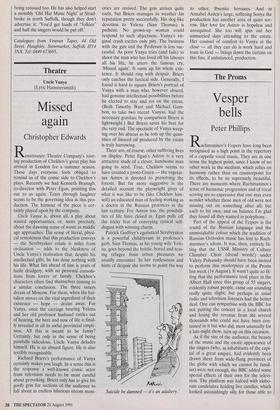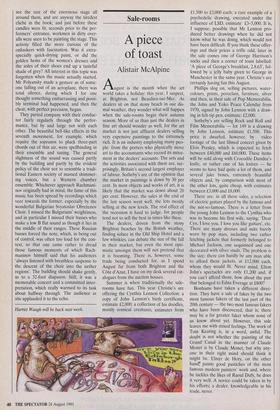The Proms
Vesper bells
Peter Phillips
Rachmaninov's Vespers have long been recognised as a high point in the repertory of a cappella vocal music. They are in one sense the highest point, since I know of no other work in the medium, which relies on harmony rather than on counterpoint for its effects, to be so supremely beautiful. There are moments where Rachmaninov's sense of harmonic progression and of vocal scoring are so expressive that one may even wonder whether those men of old were not missing out on something after all; but each to his own, and on balance I'm glad they found all they wanted in polyphony.
Part of the appeal of the Vespers is the sound of the Russian language and the unmistakable colour which the tradition of Russian Orthodox music has lent to Rach- maninov's idiom. It was, then, entirely fit- ting that the USSR Ministry of Culture Chamber Choir (dread words!) under Valery Polyansky should have been invited to perform this masterpiece at the Proms last week (14 August). It wasn't quite so fit- ting that the performance took place in the Albert Hall since this group of 55 singers, evidently robust people, came out sounding really quite slight; but perhaps as usual radio and television listeners had the better deal. One can sympathise with the BBC for not putting the concert in a local church and losing the revenue from the several thousands who could not have been con- tained in it but who did, most unusually for a late-night show, turn up on this occasion.
As if the size of the audience, the beauty of the music and the exotic appearance of the singers (who, as inhabitants of the capi- tal of a great empire, had evidently been drawn there from wide-flung provinces of the globe with which we cannot be famil- iar) were not enough, the BBC added some special effects of their own for the televi- sion. The platform was haloed with elabo- rate candelabra holding live candles, which looked astonishingly silly for those able to see the rest of the enormous stage all around them, and are anyway the tiredest cliché in the book; and just before these candles were lit, seconds prior to the per- formers' entrance, workmen in dirty over- alls were seen to be painting the stage. This activity filled the more curious of the onlookers with fascination. Was it extra- specially quick-drying paint, or did the golden hems of the women's dresses and the soles of their shoes end up a tasteful shade of grey? All interest in this topic was forgotten when the music actually started. Mr Polyansky made a gesture as of some- one falling out of an aeroplane, there was total silence, during which I for one thought something embarrassing and possi- bly terminal had happened, and then the choir, with perfect precision, began.
They parted company with their conduc- tor fairly regularly through the perfor- mance, but by and large not with each other. The beautiful bell-like effects in the seventh movement, for example, which require the sopranos to pluck three-part chords out of thin air, were spellbinding in their ensemble and tuning. The general slightness of the sound was caused partly by the building and partly by the evident policy of the choir not to resemble a tradi- tional Eastern society of massed shimmer- ing voices, but a Western chamber ensemble. Whichever approach Rachmani- nov originally had in mind, the fame of this music has been spread by recordings which veer towards the former, especially by the wonderful Bulgarian Svyatoslav Obretenov Choir. I missed the Bulgarians' weightiness, and in particular I missed their basses who make a low B flat sound as though it lies in the middle of their ranges. These Russian basses forced the note, which, in being out of control, was often too loud for the con- text, so that one came rather to dread those famous moments of which Rach- maninov himself said that his audiences `always listened with breathless suspense to the descent of the choir into the nether regions'. The building should shake gently, as to a 32-foot diapason. Still, it was a memorable concert and a committed inter- pretation, which really warmed to its task about halfway through. The audience in. situ applauded it to the echo.



















































 Previous page
Previous page